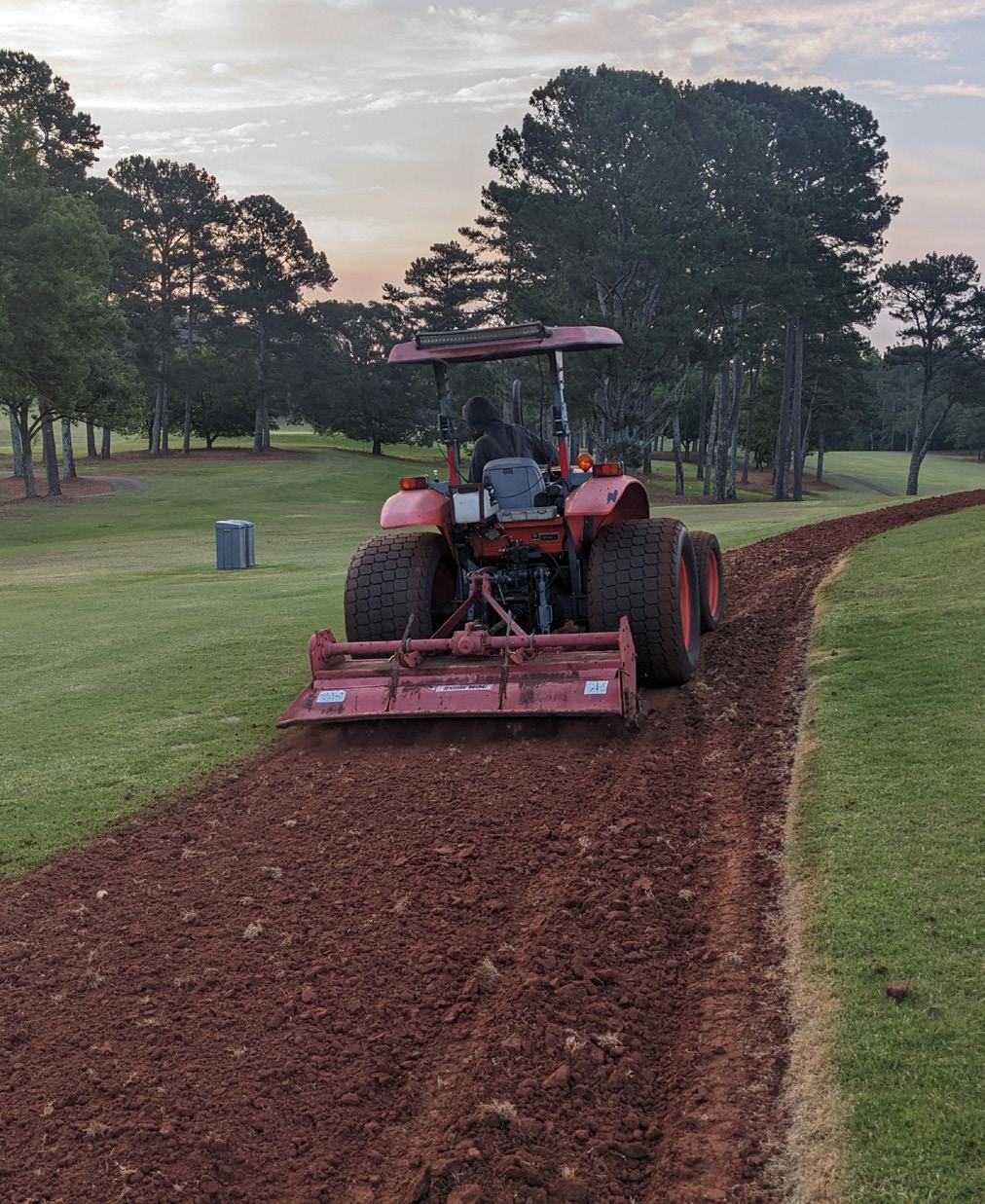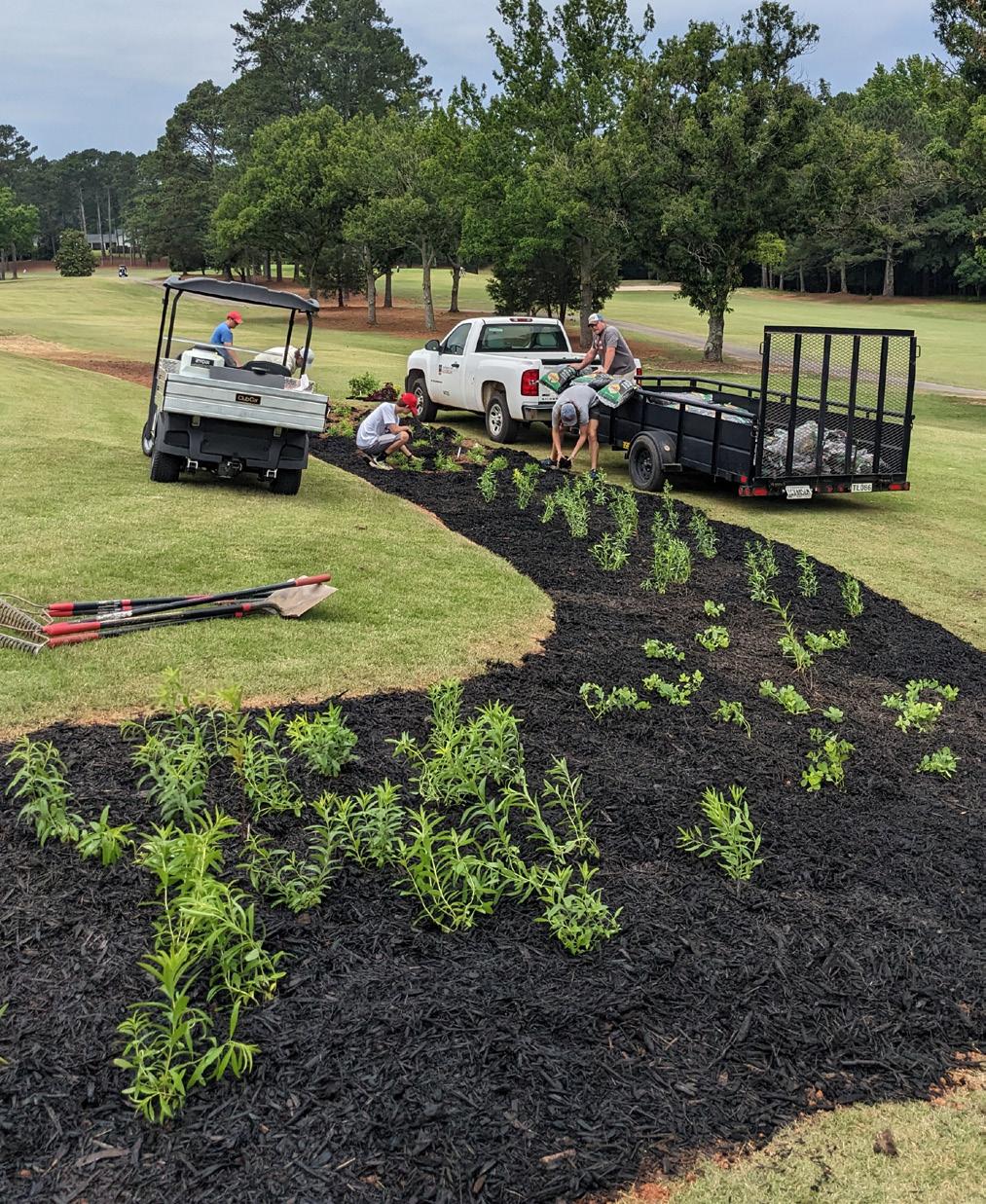
2 minute read
MONARCHS IN THE ROUGH SPOTLIGHT Seeding the Future At University of Georgia Golf Course
Whenthe University of Georgia’s popular and beloved golf course achieved Audubon International Cooperative Sanctuary Certification in March 2023, it was ahead of the game when it came to preparation, execution and documentation of what they’d long been up to on the sustainability front.
Director of Agronomy Scott Griffith and his crew had already installed buffers around their ponds and waterways. They’d created and maintained native areas to attract a wealth of wildlife, even taking part in a “BioBlitz.” They’d developed and maintained a bentgrass turf that thrives in winter and stands up to sometimes brutal summer heat. And on and on.
Advertisement
Along the way, they’d also set aside space on one of the course’s out-of-play zones to plant varieties of milkweed developed through the university’s Georgia State Botanical Gardens. This investment allowed Griffith to include the popular, ever-growing Monarchs in the Rough program as a key part of its ongoing stewardship effort, with valuable input from Audubon International experts including Frank LaVardera, Director of Environmental Programs for Golf. To be an “official” Monarchs in the Rough member, a club needs to commit to setting aside at least one acre for milkweed and wildflowers and gain access to seed provided for free by Audubon International and its partners.
“We started off a little slow,” Griffith said in June. “We planted material we acquired from the UGA Bee lab, who I have a relationship with because I’m a beekeeper. They’ve been a huge help to me.”
The spark that led to Griffith planning to join Monarchs in the Rough? A Bee Lab fundraiser. “They were selling perennial plants, pollinator plants to raise money for their programs,” he said. “So we purchased our plants from them. We were trying different varieties of perennials to see what works, what doesn’t work, what deer like.
Nothing’s deer proof, but we wanted to find out, ‘what do they like — this one versus that one?’ We have a really healthy deer population on the golf course. So that makes it kind of challenging when it comes to flowers.”
Griffith admits that the milkweed strain “sweet spot” in terms of deer damage remains a moving target.
“We’re experiencing some deer right now, nipping off the tops of our plants. When I first put them in, I treated them with a deer repellent just to get them established and rooted in so they couldn’t pull them out of the ground. Then I pulled off that because I wanted to see what they would go after. It didn’t take long. They’re definitely going after it. They’re not eating it to the ground, but they’re just nipping off the tops. We’re not gonna get any flowers because they’re just taking everything off. But we’re about to jump back on some repellent to see if we can stop them.”
So far this summer, Griffith hasn’t observed any egg laying or other monarch activity. “We put [the milkweed] in with some other perennials and it’s still kind of getting settled in. We anticipate it being a third-year deal. When we hit that third year, that’s when we’ll see [activity].
When they hit that important deer diversion target, Griffith said the course’s Monarchs in the Rough welcome mat will only get bigger. “We expect to expand our square footage over the coming years because we’ve got plenty of space. We will eventually get to at least one acre if not more. The current area we are working on has a dual purpose — we are evaluating different perennials to see which varieties work best for us.”
That fits right into Griffith’s five-year sustainability goal as he and his crew work hard to build on their newly minted ACSP for Golf Certified status.

“I think we’ve got a good base. Now we just need to expand on what we’re doing — expanding pollinator plots, expanding monarch butterfly habitats, putting in more hives. Maybe we’ll pull a little honey off it and share it with our food services and tout what we’re doing.”
To discover how to join UGA Golf Course and many others in this vital sustainability effort, visit www.monarchsintherough.org.










